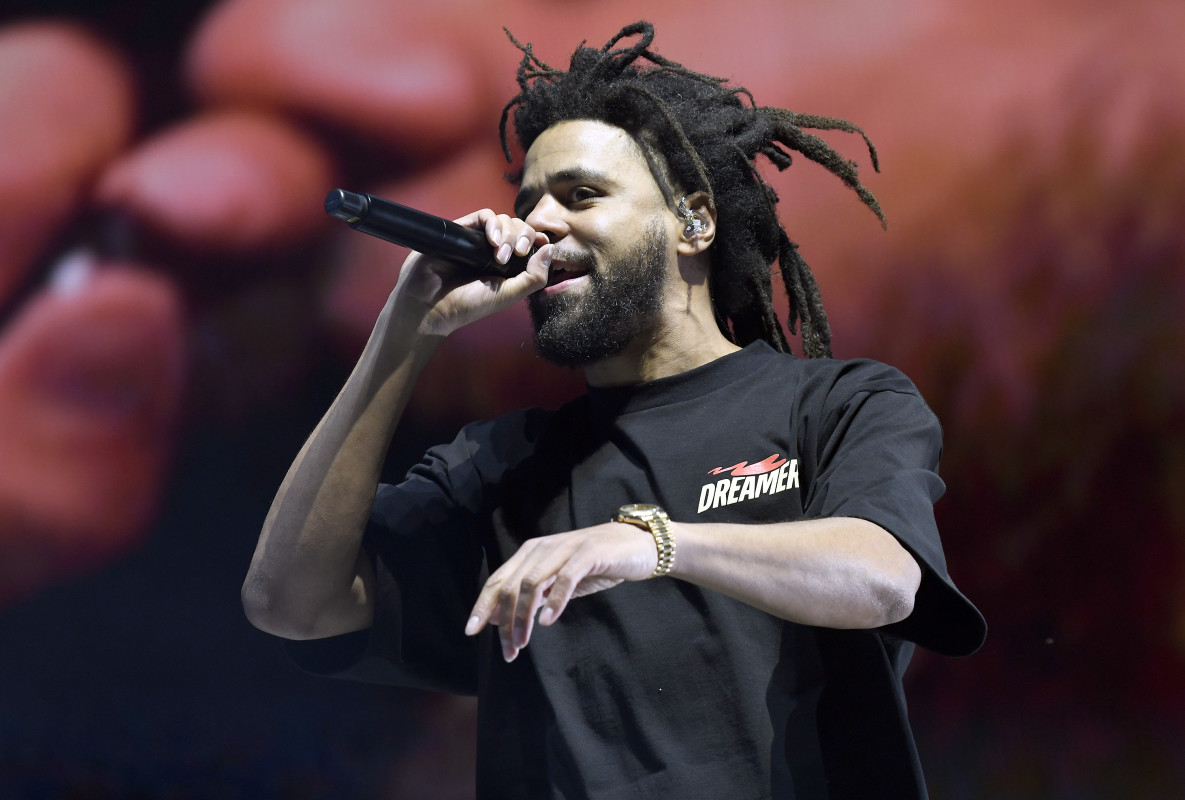
Self-aware. Mindful. Listens well and craves simplicity. You might think these terms describe a yoga instructor, not a multi-platinum-selling rap artist, but that’s just what J. Cole wants.
One of the most influential rap artists of his generation, the multi-hyphenate songwriter, entertainer, and entrepreneur often uses his platform to speak out about poverty, social issues, and injustice, always prioritizing love and family over money and materialism.
An enigma in every sense of the word, Cole stepped away from the recording studio in 2021 to play professional basketball, only to return in April 2024 with a surprise album release, “Might Delete Later.”
What is J. Cole apologizing for?
One song, in particular, from Cole’s new album, “7 Minute Drill,” made headlines — not for the fact that it intentionally disrespected Kendrick Lamar, as rap is notorious for “diss tracks” like these, but rather because Cole publicly apologized to Lamar for doing so, saying he felt “terrible” and vowed to remove it from streaming services.
What is J. Cole’s net worth?
Celebrity net worth websites peg Cole’s wealth at around $60 million, well-earned from decades spent in the deepest trenches of the music industry as a songwriter, a rapper and producer, and later, an entrepreneur and philanthropist.
A gifted wordsmith, Cole has collaborated with everyone from Janet Jackson to Missy Elliott, Nicki Minaj, Kendrick Lamar, Drake, and Rhianna, and released six platinum-certified albums, each exceeding one million in sales as certified by the Recording Industry Association of America (RIAA).
In addition, he received a Pulitzer Prize in Music for “DAMN,” and won Grammy awards for Best Rap Song for “A lot” featuring 21 Savage and Best Melodic Rap Performance for “All my life” with Lil Durk.
But in order to know who J. Cole is, you first must understand where he came from.

Tim Mosenfelder/Getty Images
What was J. Cole’s early life like?
Jermaine Lamarr Cole was born on January 28, 1985, on an Army base in Frankfurt, West Germany. His parents were enlisted there; his father, James, who was Black, married Kay, his mother, who was white, but James left the family when Cole was just a few months old.
Kay moved Cole and his brother Zach to a trailer park in Fayetteville, North Carolina, where they struggled to make ends meet: She took a job as a bartender and later delivered mail for the U.S. postal system. Cole has described the impact of seeing his mom searching for dimes and nickels to give Cole enough money for a school lunch, knowing she wouldn’t have anything to eat that day herself.
Their situation improved a few years later, when Cole was in middle school and they moved into the house whose address would be immortalized by Cole’s platinum album “2014 Forest Hills Drive.”
Being biracial helped him fit in, Cole told NPR, although he identified most with being Black. “I saw life at all levels. I'm half-black, half-white ... That's why I write so many stories from so many different perspectives, because I've seen so many."
Introduced to rap music by a cousin when he was 12, Cole was instantly captivated by the lyricism of performers like Eminem, Canubus, Nas, and Tupac, and so he began creating his own rhymes. One Christmas, his mom bought him an ASR-X synthesizer and drum machine, at a cost of nearly $2,000, which she purchased through layaway, making payments each month.
Cole created songs under the name Therapist and expressed his admiration to Bomm Sheltuh, a Fayetteville rap duo composed of Filthe Ritche and Nervous Reck. They invited him to join them during an open mic performance, and his career began.
"Rhyme patterns are nothing without meanings to the words," Cole said. "A lot of rappers can do those flows, but the raps aren't really about anything… but to have the flow and the message is one of my favorite things."
–J. Cole interviewed on NPR’s “All Things Considered,” November 1, 2011
While Cole was still a teen attending Terry Sanford High School, he appeared on two albums by the group, which then went by the name of Fayettenam Bommuhs. Cole’s musical talents weren’t only with rap, however. He also played piano and was first-chair violinist of his high school orchestra. The 6’3” Cole also played basketball — well enough that he was invited to try out as a walk-on in college.
Graduating high school with a 4.2 GPA, Cole received an academic scholarship to attend St. John’s University in New York City. The city was exactly where he was hoping to go to further his rap career, telling Hip Hop N’More “If you wanna study Islam you go to Mecca, same thing goes for Hip-Hop [and New York], I guess.” In college, Cole relished learning about poetry, history, music and film, and he enjoyed hearing lectures from guest artists like Nikki Giovanni and Spike Lee.
College was also where he met the woman who would inspire many of his songs, Melissa Heholt, whom he would marry in 2015. A notoriously private couple, they currently reside in North Carolina and share two sons.
View the original article to see embedded media.
How did J. Cole break through the rap industry?
Graduating magna cum laude from St. John’s University in 2007, Cole was living in Queens and behind on his rent, waiting for his big break. One of his friends connected him with a part-time job in advertising sales at a local newspaper and, later, as a telephone bill collector.
Each gig allowed him the freedom to spend his evenings working on his audition tape. Cole also changed his stage name from Therapist to J. Cole, telling friends the former made him feel too much like a professional wrestler. It marked a new beginning.
When his mixtape, entitled “The Come Up,” was finished, Cole boldly tried to deliver it to Jay Z by waiting outside his production studio, Baseline Studios. Cole briefly met the icon but was dismissed before he could give anything to him.
Cole realized that he wasn’t going to get any handouts, so he needed to prove himself through his music. He went back to the studio and worked on a second mixtape, “The Warm Up,” in which he not only added lyrics but also created instrumentals. It received critical acclaim and eventually caught the attention of Jay Z himself, and Cole was signed to his label, Roc Nation, less than a year later, in 2009.
View the original article to see embedded media.
What are J. Cole’s studio albums?
As part of the Roc Nation label, Cole went on tour, opening for bigger artists like Drake on his “Light Dreams and Nightmares UK Tour” and Rhianna’s “Loud Tour," collaborating with Kendrick Lamar, and sampling beats from Kanye West and Paula Abdul.
His first studio album, “Cole World: The Sideline Story” was released in September 2011, where it hit #1 on Billboard in its first week. It depicted his early struggles breaking into the music industry and would earn him a Grammy nomination as the year’s best new artist.
Cole’s second album, “Born Sinner,” released in January 2013, was a darker tale of Cole’s struggles with his demons, including greed and depression, which ultimately ended in redemption. It sampled Jay Z and Notorious B.I.G. and featured TLC on the song “Crooked Smile” and Kendrick Lamar on “Forbidden Fruit.”
After the 2014 shooting of Michael Brown in Ferguson, Missouri, Cole flew to the state to meet with protestors, telling Complex News that his initial reaction was disbelief that police brutality was happening again to the Black community before asking, “what can we do?” He said he was there to listen.
In December 2014, “2014 Forest Hills Drive” was released, which many consider to be Cole at his finest. It detailed his perils on his quest for fame and fortune while urging listeners to seek instead what really mattered in life. It won Top Rap Album at that year’s Billboard Music Awards as well as Album of the Year at the BET Hip Hop Awards.
Cole also released a documentary series about the album, “J. Cole Road to Homecoming,” which culminated in a concert performance of his “2014 Forest Hills Drive” tour.
Cole ventured further into the political arena in 2016 when he performed with Jay Z and Beyoncé at a rally for Hillary Clinton in Cleveland, Ohio.
In December 2016, Cole’s fourth album, “4 Your Eyez Only,” was released, and it made its debut at #1 on Billboard. The album was an opus on the life of his friend, James McMillan Jr., who got caught up in drugs and was murdered on the streets at age 22. Cole embarked on his first world tour promoting the album, covering more than 60 stops in North America, Europe, and Australia, no doubt expanding his wealth. He also recorded a documentary, “Eyez” about the making of the album.
KOD. 3 meanings.
— J. Cole (@JColeNC) April 19, 2018
Kids on Drugs
King Overdosed
Kill Our Demons
The rest of the album I leave to your interpretation.
Cole said there were several meanings behind his 2018 album, “KOD.” It highlighted familiar territory for the rapper, focusing on drug abuse, depression, and greed, and once again, it debuted at #1 on the Billboard charts.
In his 2021 release, “The Off-Season,” Cole featured a Who’s Who of hip hop artists, from Lil Baby, Cam’ron, and 21 Savage to Lil Jon and P Diddy. It also went certified platinum — Cole’s sixth album to do so.
What are J. Cole’s other ventures?
Cole must have separate bank accounts to keep track of all the income he’s accrued. In addition to his album sales and ticket sales for his tours, he founded the Dreamville Record label in 2007, which signed a deal with Interscope Records in 2014. The label released three compilation albums, “Revenge of the Dreamers,” “Revenge of the Dreamers II” and “Revenge of the Dreamers III,” with featured artists including Ari Lennox, Bas, Cozz, EarthGang, JID, Lute, and Omen.
The label also produced two sold-out Dreamville Music Festivals in 2019 and 2022. Taking place in Raleigh, North Carolina, the daylong festival of music, food, culture, and art saw attendance records shattered in 2022, as 80,000 fans came out to celebrate.
Cole’s additional ventures include a nonprofit, the Dreamville Foundation, which donates school supplies and provides field trips to North Carolina school children; a production company, Dreamville Studios; and a movie company, Dreamville Films, which formed a partnership with HBO in 2015.

Nicole Sweet/BAL/Basketball Africa League via Getty Images
J. Cole’s basketball career explained
Astonishingly, Cole was not content simply to be a rap star, telling Sports Illustrated, “Sports is where it started for me. It parallels my life. Rap is such a competitive thing. That's why I have to watch sports. I got to keep up. It's my life in just another form.”
In 2021, he was signed to a three-game contract with the Basketball Africa League (BAL), playing for the Rwanda Patriots. He only scored five points, and had three assists and five rebounds — leading some to believe it was a marketing stunt. Ever the enigma, Cole proved them wrong by signing with the Canadian Elite Basketball League in 2022, playing guard for the Toronto Shooting Stars.
He only played for one month before taking an indefinite leave of absence, ostensibly to perform over the summer concert series. In the interim, he received endorsement deals from Puma and was featured in the NBA 2K23 video game — he was even featured as their cover star.
In 2023, Cole announced a minority ownership stake in the NBA’s Charlotte Hornets basketball team as part of an ownership package with Michael Jordan.
View the original article to see embedded media.
What is J. Cole’s biggest hit?
According to Spotify, “No Role Modelz” is J. Cole’s biggest hit, amassing more than 2 billion streams as of December 2023.







